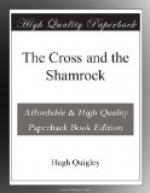any conceivable effect, was likely to prove an occasion
to him of such annoyances, on account of his faith,
as we have described in these pages. “The
character,” however, he succeeded in procuring,
and written in no niggard terms. If it offended
in any thing, it was in being too favorable to the
bearer. It was by means of this paper, with the
respectable name of Rev. Dr. H——
at its foot, that Cunningham succeeded in ingratiating
himself into the confidence and favor of the O’Clerys
during the voyage, as well as by his attention to Mr.
Arthur O’Clery during his fatal sickness.
The reverend gentleman whose signature stood at the
foot of the “character” was well known
to the O’Clery family; and hence, undoubtedly,
originated the intimacy, strengthened by his asserting
falsely that he was a relative of the priest, which
subsequently enabled him to rob the poor widow and
her orphans of their entire means. Accomplished
villain as he was, Religion had not yet lost her whole
sway over his soul, and by way of punishing himself,
but in reality, making bad worse, the second day after
his liberation from arrest consequent on the theft,
he listed in the United States army, and was hurried
off forthwith to the field of battle, in Florida.
The gnawing worm of remorse still followed him on board
of ship, and in barrack, and on the scorching plains
of the south. He had less dread of the sabre,
or grape, or rifle of the enemy, than of the thought
that he had robbed the poor widow, and availed himself
of the confidence of confession to elicit from his
too confiding director the paper that principally
enabled him to do so. He had plundered an honest
family of their all, and it was of no use to him.
The injury done was severely felt by not only one,
but several. The pleasure, comfort, or happiness
to him was nothing at all. Unhappy man, what was
he to do? He could not help it now; the enemy
was before him, and he could not turn his back, and
the money was lost forever. He feared death would
deprive him of the means of making restitution, for
he had a presentiment he would fall on this very day.
First, that sin he committed in Liverpool, when, in
an evil hour, yielding to the advice and example of
wicked companions, he took to drink in order to smother
the thought of it; and drink caused him to rob the
widow, and to shun further the thought of these crimes
he enlisted in the army; but yet, here, in the very
ranks, with drums beating, and music playing, amid
the shouts of Indians and din of battle, the sins
were uppermost still in his mind. How horrid
must be the feelings of poor Cunningham, with death
staring him in the face, and yet he expected nothing
but judgment after death! In vain did he look
around for the tall and venerable form of Father McEl——,
to cast himself at his knees, and ask for advice,
blessing, and forgiveness. He was nowhere now
to be found. O misery unspeakable! And but
yesterday, but this very morning, four hours ago, that
father went through the ranks, encouraging the men,




